Judean mountains
| Judaean Mountains | |
|---|---|
| Harei Yehuda / Jibal Al Khalil | |

View of the Judaean Hills near Jerusalem
|
|
| Highest point | |
| Peak | Mount Halhul |
| Elevation | 1,026 m (3,366 ft) |
| Coordinates | 31°40′N 35°10′E / 31.667°N 35.167°ECoordinates: 31°40′N 35°10′E / 31.667°N 35.167°E |
| Geography | |
| Parent range | Great Rift Valley |
| Geology | |
| Age of rock | Late Cretaceous |
| Type of rock | Terra rossa, limestone |
The Judaean Mountains, or Judaean Hills (Hebrew: הרי יהודה Harei Yehuda, Arabic: جبال الخليل Jibal Al Khalil), is a mountain range in Israel and the West Bank where Jerusalem and several other biblical cities are located. The mountains reach a height of 1,026 metres (3,366 ft). The Judean Mountains can be separated to a number of sub-regions, including the Mount Hebron ridge, the Jerusalem ridge and the Judean slopes. These mountains formed the heartland of the Kingdom of Judah, where the earliest Jewish settlements emerged.
The range runs in a north south direction from Galilee to the Negev with an average height of 900 metres (2,953 ft). The Judaean mountains encompass Jerusalem, Hebron, Bethlehem and Ramallah. The range forms a natural division between the Shephelah coastal plains to the west and the Jordan Rift Valley to the east. The northern section, in the Ramallah area, is also known as Samarian Hills, while the middle section is also referred to as 'Jerusalem Hills'.
The Judaean Mountains were heavily forested in antiquity. The range is mostly composed of terra rossa soils over hard limestones.
The Judaean Mountains are the surface expression of a series of monoclinic folds which trend north-northwest through Israel. The folding is the central expression of the Syrian Arc belt of anticlinal folding that began in the Late Cretaceous Period in northeast Africa and southwest Asia. The Syrian Arc extends east-northeast across the Sinai, turns north-northeast through Israel and continues the east-northeast trend into Syria. The Israeli segment parallels the Dead Sea Transform which lies just to the east.
...
Wikipedia

